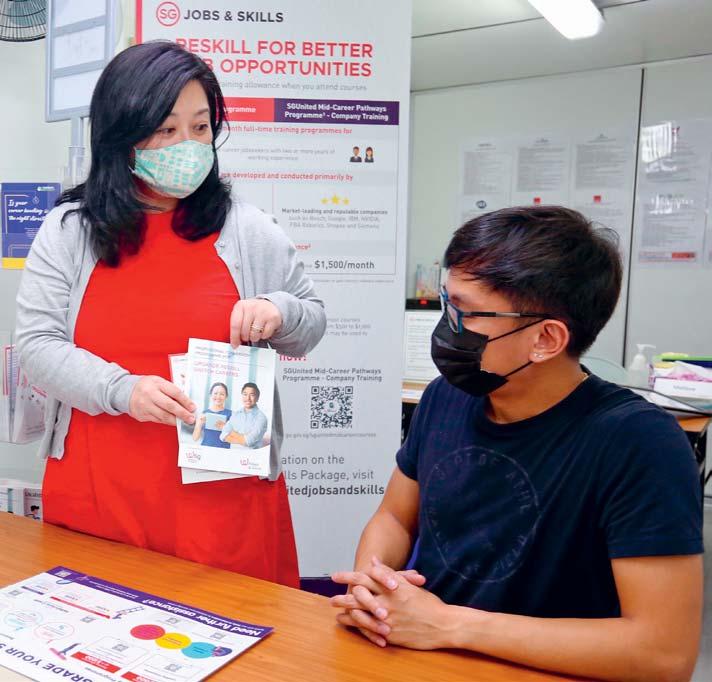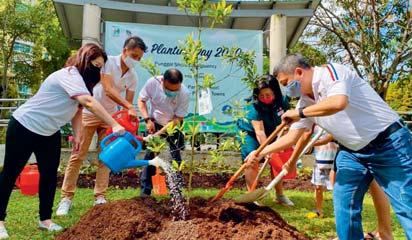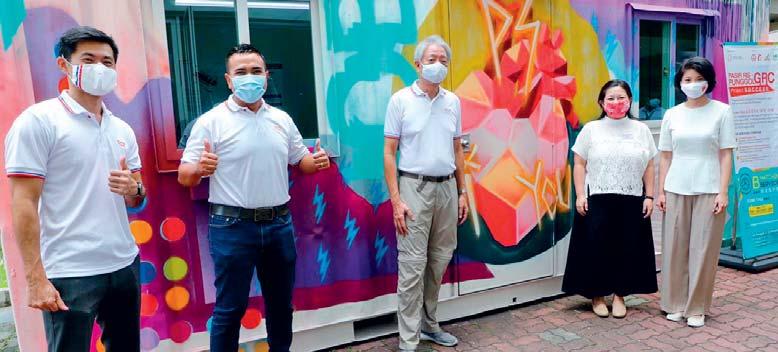
8 minute read
#PS I love you
No, not you. The PS stands for Punggol Shore, and the line sums up Member of Parliament for Pasir Ris-Punggol GRC Ms Yeo Wan Ling’s warm approach to her constituency.
It’s all about community love and neighbourly kindness at the Punggol Shore constituency. Posters, banners and even a car decal featuring various Punggol Shore programmes are emblazoned with hearts.
Its new MP, Ms Yeo Wan Ling, 44, who helms the constituency after GE2020, comes up with monthly “love notes” which are one-page newsletters to her residents put up in the lift cars across the estates.
If there were a constituency tagline, it would be “PS I love you”. The PS refers to Punggol Shore, which is part of Pasir Ris-Punggol GRC.
Besides being used in community hot spots such as a shipping container turned job-search facility located just outside the Punggol 21 Community Club, Ms Yeo also uses it as a hashtag for many of her social media posts, #PSILoveYou.
As part of promoting kindness and understanding, the Punggol Shore team works with the Singapore Kindness Movement on long term constituencywide campaigns. Singa the Courtesy Yeo’s neighbourhood walkabouts and community events.
“I really hope to manage my district with love! For a community to thrive, we need lots of kindness, consideration and good old neighbourly love, especially Yeo, who ensures that Punggol Shore’s programmes and her team’s interactions with residents are driven by the same values.
Why Punggol Shore?

Ms Yeo shares the values of kindness, consideration and neighbourly love with residents.
“We thought that a name change was important given that Punggol is a growing town, and Punggol North is no longer in the north of our town, with the creation of the Punggol Coast ward. Hence, as a team, we took a page from the Punggol Coast and re-named beautiful nature and relaxed eco vibe of Punggol Town,” said Ms Yeo.
Ms Yeo shared that Punggol Shore is the oldest area in Punggol Town. Some of its 11 HDB districts and seven condominiums are about 20 years old. Thus, unlike the young families who populate newer areas such as Punggol Coast and Punggol West, her constituency has a good number of mature families.
“While our town is still growing with the introduction of new Build-To-Order flats, we recognise that Punggol Shore is growing older. We have a good proportion of children who grew up here and who are now teenagers. Similarly, their parents are now in their late 30s and early 40s and are starting to worry about their ageing parents. We need to develop new programmes that are relevant to our town which is changing day by day,” she said.
Ms Yeo visits about four blocks in a week to meet her constituents, and holds regular weekday afternoon kopi understand the changing needs of her residents as well as to get inspiration from them.
“Indeed, our residents have been a great muse to our upcoming programmes. We met many farming enthusiasts during our block visits who wanted to have farming and community gardening programmes in the estates. We loved the idea, and are working on a town-wide urban farming project that will engage not only our residents, but also our community partners such as the schools and our local merchants. Our residents are very creative and passionate stakeholders in building up our town,” she shared.

All hands on board for Punggol Shore’s tree-planting day which took place on Nov 15, 2020. Ms Yeo, branch activists and key grassroots leaders planted a clove tree.
Fewer dishes at dinner
But just like the rest of Singapore, the residents of Punggol Shore are plagued with the same Covid-19 related concerns about jobs and income loss which Ms Yeo — true to form — takes to heart.
When she and her team of volunteers meet with residents, they look out for signs of resident distress such as not getting along with their neighbours, social isolation and sometimes even aggressiveness.
“Sometimes, our residents can get very angry with our team about a missing tile, or with a neighbour pulling a chair across the floor at odd hours. But when we approach them with compassion, listen with care and earn their trust, we realise that, more often than not, the root of their worries is not about the tile or the noise. It is usually about job insecurities, families and livelihoods,” she said.
While the official narrative focuses on the big economic numbers, Ms Yeo pointed out that in the home, a 30 per cent drop in income could translate into having less food on the table for the family. Instead of “3 dishes 1 soup” ( ) in a typical Chinese home-cooked meal, a resident could be looking at “1 dish 1 soup”. “Our residents can feel the hurt, especially when it comes to not being able to provide for their families and children,” she noted.
With this in mind, she has tried to lessen the sting by delivering new initiatives with cheer.
Programmes with heart

The brightly-coloured shipping container turned job-search facility contains 55,000 jobs for job seekers in Punggol Shore.
While every constituency offers job-matching services, the Punggol Shore Job Container launched on September 18, 2020 has the tagline “This contains 55,000 jobs”, a play on the word container. The idea of having a real physical container as a “jobs container” was inspired by Punggol residents. During Ms Yeo’s chats with them, many asked her where the jobs mentioned by the Government were, and the Punggol Shore team came up with the idea of a physical landmark to show residents where the jobs were contained.
Painted in bright graffati colours by a Punggol artist, the interior comprises cushions, plants and is staffed by trained career coaches from the Workforce Singapore agency. Its cozy and safe ambience will hopefully encourage residents to be more open and comfortable about looking for a job.
Punggol Shore will launch a second jobs initiative in December 2020, called PS Lvbang which is a play on the word “lobang” in Malay which means leads. which housewives or other residents can take on, on a project or freelance basis, to supplement the family income.
“It could be something like designing eight posters in a month, or even delivering parcels in their neighbourhoods which they can do from home or within the community. This allows them to work their life schedules around the job,” pointed out Ms Yeo.
Another feature of her approach to solving problems in the community is consultation and innovation.
For instance, one of the biggest problems which Punggol Shore residents faced was pigeons which would roost and leave their droppings at many units. The original plan was to build bird nets for entire stacks of HDB blocks but some residents she talked to vetoed it as they felt that the nets spoiled their views and ruined the pretty exteriors of their homes.
“In the end, we hit on a creative solution of letting individual units install bird nets. This required a bit of work with the Town Council and calling for a special tender,” she said. “I felt that this is necessary because families who are and unsightly feathers.”
Another instance of an alternative solution was when residents complained about second-hand smoke from their neighbours.
“For everyone who hates it, there’s also people who smoke as part of their daily lives. As an MP representing all my constituents, I need to understand both sides,” she said.
Ideally, residents should talk to each other and come to an agreement. But if that is not possible, Ms Yeo has hit on the residents.
She feels strongly that everyone needs to be given a choice to make good decisions.
“I believe that when you enforce everything, people cooperate only because they are afraid of the law, not necessarily because they want to do the right things. We stop being a civic society, if everything is just about legislation, the law and rules,” she said.
Said Ms Yeo: “The new programmes we have rolled out or are going to roll out, are initiatives born out of innovation, compassion and I hope that they are also highly effective."
JUST GETTING A JOB DONE IS NOT ENOUGH

For an MP, the bottomline is getting a job done well.
Being efficient and effective are traits which Ms Yeo honed in a 15-year career at the Economic Development Board, where her job was to attract foreign investments into Singapore.
But it was when she left EDB and started Caregiver Asia that she realised these traits are sometimes not enough.
Caregiver Asia is an online platform which allows care seekers to find freelance caregivers. The matching process could take a mere 10 minutes but Ms Yeo found that eight in 10 careseekers would still pick up the phone to speak to a customer service officer.
“Actually they just wanted someone to listen to them,” said Ms Yeo, who left Caregiver Asia when she joined the NTUC in August 2020. “That was a very important lesson for me: while efficiency is important, it needs to be conducted with compassion and a listening ear.”
She has applied it to her work at Punggol Shore over the last five months, where she spends long hours chit-chatting with residents during her block visits and kopi sessions.
In fact, it was a young resident’s statement on the importance of listening which made a huge impact on her.
The 21-year- old female resident turned up at Ms Yeo’s Meet-the-People session did not understand her explanations on why certain things could not be done and was left dissatisfied.
She later emailed Ms Yeo and ended with: “Sometimes we just seek to be understood, instead of having to understand.”
Recounted Ms Yeo: “As I meditated on it, I realised that there is much wisdom in that statement.”
Happily, the two agreed to disagree, and they worked on a solution to resolve the issue faced by the resident. She has since become a member of Ms Yeo’s team of researchers for her parliamentary speeches.
“I choose to believe and trust that our residents want to do their best for our Punggol Shore community. Together with kindness and compassion, we can build a wonderful happy home for all of us here,” said Ms Yeo.






